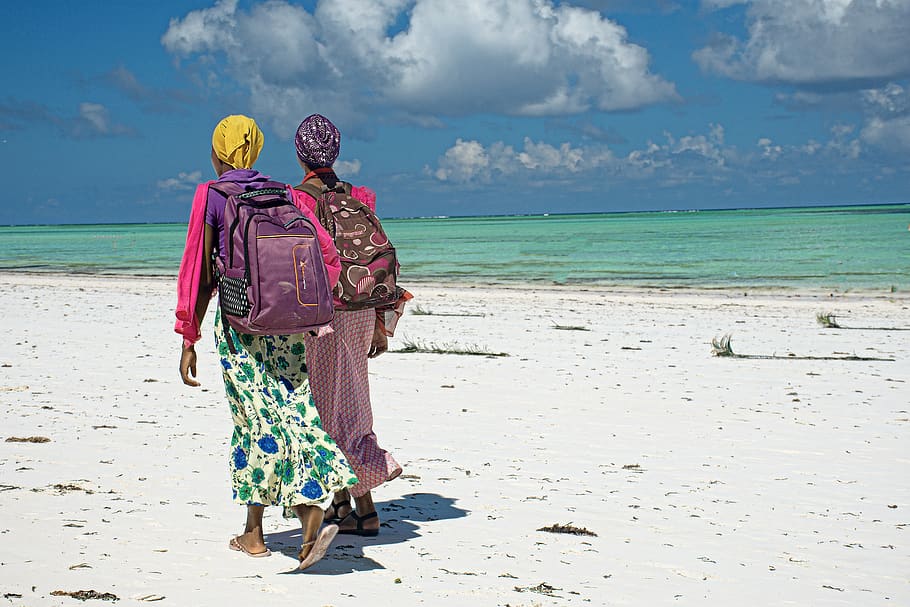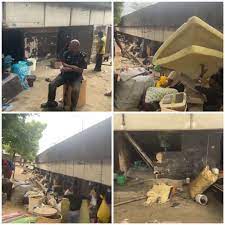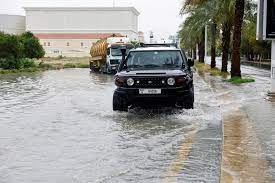Predicting future populations with perfect accuracy is impossible, but I can share with you the most up-to-date data and projections for African countries’ populations in 2024.
Top 10 Most Populous African Countries (Estimated for 2024)
- Nigeria: 229.2 million
- Ethiopia: 134.3 million
- Egypt: 117.5 million
- Democratic Republic of the Congo: 103.8 million
- Tanzania: 68.2 million
- South Africa: 60.7 million
- Kenya: 55.0 million
- Uganda: 49 million
- Ghana: 35 million
- Madagascar: 30 million
These figures are based on estimates from the United Nations Department of Economic and Social Affairs Population Division, using a combination of historical data and population models. It’s important to remember that these are just estimates, and the actual populations in 2024 could be higher or lower.
Here are some additional facts about African populations:
- Africa is the world’s second-most populous continent, after Asia.
- Africa’s population is growing rapidly, and it is expected to double by 2050.
- The majority of Africans live in rural areas, but urbanization is increasing rapidly.
- Africa has a young population, with the median age of 19.5 years.
How many people live in Nigeria?
The population of Nigeria is a dynamic figure that changes constantly due to births, deaths, and migration. However, here are some estimates based on different sources:
- Worldometer: As of today, Worldometer estimates Nigeria’s population at 226,222,640.
- Statista: As of Statista estimates the population at around 229.2 million.
- Wikipedia: Wikipedia cites the 2022 population estimate as 218.5 million, though it notes that this is likely an undercount.
It’s important to note that these are all estimates, and the exact number of people living in Nigeria is difficult to determine precisely. However, they give you a good general idea of the country’s population size.
If you’re interested in learning more about Nigeria’s population, you can check out the websites of the National Population Commission of Nigeria or the World Bank.
How many people live in Ethiopia?
The population of Ethiopia is estimated to be around 134.3 million people as of July 2023, making it the second most populous country in Africa after Nigeria. This figure is constantly changing due to births, deaths, and migration, so it’s important to note that it’s an estimate.
If you’re interested in learning more about the demographics of Ethiopia, I can share some additional information like the age distribution, ethnic makeup, or major cities. Just let me know what you’d like to know!
How many people live in Egypt?
The population of Egypt is actually quite dynamic and constantly changing, so there are different estimates depending on the source. However, here are some recent figures to give you a good idea:
- Worldometer: As of today , Worldometer estimates the current population of Egypt to be 117,519,101.
- Wikipedia: Based on July 2023 data, Wikipedia states the population to be around 104 million.
- OECD/World Bank: Statistics from 2023 estimate the population to be around 109.5 million.
It’s important to remember that these are just estimates, and the actual number could be slightly higher or lower. However, they all give you a good sense of the magnitude of Egypt’s population, which is currently the 14th most populous country in the world and the 3rd most populous in Africa.
If you’re looking for the most precise and up-to-date information, I recommend checking trusted sources like Worldometer or official government reports. These sources usually update their population data regularly.
How many people live in Democratic Republic of the Congo?
The population of the Democratic Republic of the Congo (DRC) is estimated to be around 103.8 million as of today. However, it’s important to note that there are some discrepancies in different sources:
- Worldometers: Estimates the current population at 103,776,496.
- Wikipedia: Cites a population of around 112 million.
- World Bank: Uses an estimate of 102.2 million for mid-2023.
These variations are due to the challenges of accurately counting the population in such a large and geographically diverse country. Regardless of the exact figure, one thing is clear: the DRC is a very populous country, ranking among the most populated in Africa and the world.
How many people live in Tanzania?
The population of Tanzania is currently estimated to be around 68.33 million as of December 15, 2023. This figure is based on Worldometer’s elaboration of the latest United Nations data.
Here are some additional details:
- Mid-year 2023 estimate: 67.44 million
- 2022 national census: 62 million
- Percentage of world population: 0.84%
It’s important to note that population figures can change rapidly, especially in countries with high birth rates and limited access to accurate data. So, the actual number of people living in Tanzania may be slightly higher or lower than the estimates provided.
How many people live in South Africa?
The number of people living in South Africa depends on which source you consult and what specific date you’re interested in, as populations are constantly changing. Here are some estimates:
- Worldometer: Estimates the current population at 60,690,259.
- Statistics South Africa (2024): Estimates the population at 60,414,495.
Additional resources:
- South Africa’s official government website: States the mid-year 2021 population at 60,14 million.
- Wikipedia: Estimates the population at over 62 million, but this information may not be the most recent.
It’s important to note that these are just estimates, and the actual number of people living in South Africa may be slightly higher or lower.
How many people live in Kenya?
The number of people living in Kenya depends on the source and the date you’re looking at, as populations are constantly changing. Here are some options:
- 2023 estimate: Worldometer estimates the population of Kenya to be 55,597,035. This is based on the latest United Nations data and includes projections for population growth.
- 2022 estimate: The World Bank estimates Kenya’s population in 2022 to be 51,044,355. This is based on their own data and analysis.
- 2019 census: The most recent official census in Kenya was conducted in 2019 and found a population of 47,558,296. However, it’s important to note that this doesn’t include the population growth that has occurred since then.
So, depending on the source and date you prefer, the answer could be anywhere between 47.6 million and 55.6 million.
How many people live in Uganda?
The population of Uganda is estimated to be around 49.18 million people. This figure comes from Worldometer’s elaboration of the latest United Nations data. However, there are some variations depending on the source you consult:
- Worldometer: 49,184,377
- Wikipedia: Around 49.6 million as of 2023
- Uganda Population (2023): Estimated at 48,582,334 people at mid-year 2023
It’s worth noting that these figures are constantly changing due to factors like births, deaths, and migration.
Here are some additional details about the Ugandan population:
- Density: 243 people per square kilometer (630 people per square mile)
- Rural vs. Urban: 76% of the population lives in rural areas, while 73% of the workforce is employed in agriculture.
- Capital City: Kampala, with a population of around 8.5 million.
How many people live in Ghana?
The population of Ghana is currently estimated at between 34 and 35 million people, depending on the source and date. Here are some specific figures:
- Worldometer: Worldometer estimates the population to be 34,419,079. This is based on an elaboration of the latest United Nations data.
- Wikipedia: The Demographics of Ghana page on Wikipedia cites a 2021 census population of 30,832,019. However, it also mentions that the population is constantly growing, and estimates suggest it could be closer to 32 million by now.
Therefore, the most accurate answer is that the population of Ghana is over 30 million, but likely closer to 34 or 35 million. It’s important to remember that population data can change rapidly, and different sources may use different methodologies, leading to slight variations in their estimates.
If you’d like to stay updated on the latest population figures for Ghana, I recommend checking with reputable sources like Worldometer, the United Nations Population Division, or the Ghana Statistical Service.
How many people live in Madagascar?
The population of Madagascar is estimated to be around 30.65 million. Here are some sources you can check for more details:
- Worldometer: Their current live estimate for Madagascar’s population is 30,650,242.
- World Bank: They provide an overview of Madagascar’s population, including its growth rate and poverty levels.
- Britannica: They offer information about Madagascar’s history, population, languages, and geography.
It’s important to note that population figures can fluctuate slightly depending on the source and the methods used for estimation. However, the figures I provided should give you a good idea of the current population of Madagascar.
What country in Africa has the fastest growing population?
South Sudan has the fastest-growing population in Africa, with an annual growth rate of 4.78%. This means that the population of South Sudan is increasing at a rate of nearly 5% per year.
Here are some other African countries with high population growth rates:
- Angola: 3.34%
- Malawi: 2.28%
- Burundi: 3.63%
- Niger: 3.63%
It’s important to note that population growth rates can fluctuate year to year, so these figures may change in the future. Additionally, it’s worth considering factors like the absolute size of the population when discussing growth rates. While South Sudan has the highest rate, countries like Nigeria and Ethiopia have much larger populations and contribute significantly to overall population growth in the continent.
What is the best country in Africa to live in?
Determining the “best” country in Africa is subjective and depends heavily on individual priorities and values. Different countries excel in various aspects, making a single definitive answer impossible. Instead of focusing on a single “best” option, consider exploring some of the top contenders based on different factors:
Economic factors:
- Mauritius: Renowned for its stable economy, low crime rates, and high quality of life.
- Botswana: Boasts impressive economic growth, political stability, and strong social safety nets.
- Rwanda: Has experienced remarkable economic transformation and prioritizes development initiatives.
Social factors:
- Namibia: Praised for its strong sense of community, peaceful environment, and commitment to social justice.
- Ghana: Known for its vibrant culture, welcoming people, and progress towards gender equality.
- Senegal: Celebrated for its rich artistic heritage, strong sense of family, and focus on education.
Environmental factors:
- Seychelles: Offers stunning natural beauty, diverse marine life, and a commitment to environmental sustainability.
- Ethiopia: Home to breathtaking landscapes, rich biodiversity, and a growing eco-tourism industry.
- Madagascar: Features unique ecosystems, diverse wildlife, and initiatives to protect endangered species.
Ultimately, the best country in Africa for you depends on your specific priorities and preferences. Researching and comparing different countries based on your desired factors like cost of living, work opportunities, healthcare, safety, culture, and environment will help you identify the most suitable option for your individual needs.
Remember, every country has its own strengths and weaknesses. Focusing on finding a place that aligns with your values and aspirations will lead you to a more fulfilling experience than simply seeking the “best” in absolute terms.
Which is the largest city in Africa?
The title of the largest city in Africa currently belongs to Lagos, Nigeria, with an estimated population of over 9 million inhabitants living within the city proper. This figure can vary slightly depending on the source and methodology used for estimation.
Lagos has held this position for several years, continuously growing as a major economic and cultural hub in West Africa. However, other African cities like Kinshasa (Democratic Republic of the Congo) and Cairo (Egypt) also boast impressive populations, with Kinshasa being a close second with around 7.8 million and Cairo coming in third with approximately 7.7 million residents.
So, while Lagos holds the current crown for being the largest city in Africa, the continent is home to several other vibrant and populous urban centers, each with its own unique character and contribution to the rich tapestry of African life.
Which city is bigger in Nigeria?
Population:
- Lagos is the undisputed winner in terms of population, with an estimated 21 million residents in 2023, making it the most populous city in Nigeria and the largest in sub-Saharan Africa.
Land area:
- Ibadan, located in Oyo State, holds the title for the largest land area among Nigerian cities, covering approximately 3,080 square kilometers.
Economic activity:
- Lagos again takes the lead in terms of economic importance. It serves as Nigeria’s financial hub, boasting a thriving stock exchange, major corporations, and a significant industrial sector.
Urban density:
- Lagos once again reigns supreme, cramming its immense population into a relatively small area (3,345 square kilometers), resulting in a bustling, densely packed urban environment.
Therefore, depending on your specific criteria for “bigger,” the answer could be Lagos for population, economic activity, and urban density, or Ibadan for land area.
What is Africa’s smallest country?
The smallest country in Africa by land area is the Seychelles, a beautiful archipelago nation located in the Indian Ocean, east of mainland Africa. It consists of 115 islands, with Mahé being the largest and most populous. Its total land area is just 455 square kilometers, making it smaller than many major cities around the world.
Despite its size, the Seychelles boasts a rich culture, stunning landscapes, and diverse wildlife. It’s a popular tourist destination known for its pristine beaches, coral reefs, and lush rainforests.
What are Africa’s 3 fastest growing cities?
Determining Africa’s top 3 fastest growing cities depends on the specific timeframe and chosen metric. Different sources may offer slightly different rankings based on their data and analysis. However, here are three contenders for the top spots based on recent reports and population growth estimates:
1. Niamey, Niger: With an estimated growth rate of 101% between 2020 and 2035, Niamey, the capital of Niger, is projected to experience the most rapid population expansion in Africa. This surge is attributed to factors like rural-urban migration, high birth rates, and economic opportunities emerging in the city.
2. Tete, Mozambique: Another contender for the top spot is Tete, a city in Mozambique with a projected growth rate of 101% during the same period. Its location along the Zambezi River, rich mineral resources, and ongoing infrastructure development projects are fueling this rapid expansion.
3. Dar es Salaam, Tanzania: This bustling coastal city in Tanzania is expected to grow by 100% between 2020 and 2035. Its role as a major economic and transportation hub, coupled with a vibrant informal sector, attracts a large influx of people seeking opportunities.
It’s important to note that these projections are based on estimates and can be influenced by various factors. Additionally, other cities like Bobo-Dioulasso in Burkina Faso and Mwanza in Tanzania also exhibit significant growth potential.
To get a more comprehensive picture, you can explore resources like the African Development Bank’s “Africa’s Urbanisation Dynamics 2022” report or the World Economic Forum’s analysis of “Africa’s fastest-growing cities.” These reports offer valuable insights into the drivers of urban growth across the continent and highlight the complexities involved in pinpointing the absolute fastest-growing cities.
Which city has the largest economy in Africa?
Determining the city with the largest economy in Africa depends on how you define “economy.” There are two main contenders, each with its own strengths:
Johannesburg, South Africa:
- Private wealth: Johannesburg holds the title of the wealthiest city in Africa, with an estimated private wealth of $239 billion as of 2021. This wealth is primarily concentrated in Sandton, home to the Johannesburg Stock Exchange (JSE) and headquarters of major African corporations.
- Economic sectors: The city boasts a diverse economy driven by finance, insurance, real estate, manufacturing, and mining. Its JSE is the largest stock exchange in Africa.
Cairo, Egypt:
- GDP: Cairo boasts the highest GDP of any African city, estimated at around $140 billion. This makes it a major economic powerhouse in the region.
- Economic sectors: The city’s economy is driven by diverse sectors like financial services, construction, telecommunications, retail, and tourism. It also hosts the highest number of billionaires in Africa.
What is the wealthiest nation in Africa?
Determining the “wealthiest” nation in Africa can be complex and depends on how you measure wealth. Here are some perspectives to consider:
Gross Domestic Product (GDP): Using GDP as a metric, South Africa currently holds the top spot with a nominal GDP of $426 billion (2023 estimate). However, this doesn’t necessarily translate to individual wealth or well-being.
GDP per capita: When considering GDP per capita, which indicates average income per person, Botswana takes the lead with an estimated $17,048 (2023). This provides a more nuanced picture of individual wealth distribution.
Human Development Index (HDI): The HDI, which takes into account factors like life expectancy, education, and standard of living, offers a broader view of overall well-being. Mauritius currently ranks highest in Africa on the HDI, followed by Seychelles and Tunisia.
Resource wealth: Some nations possess vast natural resources like oil or minerals, which contribute significantly to their overall wealth. However, resource dependence can pose challenges in terms of sustainable development and equitable distribution of wealth.
Ultimately, defining the “wealthiest” nation depends on your chosen criteria and priorities. Each perspective offers valuable insights into different aspects of African nations’ prosperity.
It’s important to remember that wealth is multifaceted and goes beyond just economic indicators. Factors like social stability, environmental sustainability, and cultural richness also contribute to a nation’s overall well-being.
Which African country has the most citizens?
Nigeria holds the title of the most populous African country with an estimated 223 million citizens as of 2023. Its population continues to grow steadily, making it the seventh most populous nation globally.
Here are some other notable African countries with large populations:
- Ethiopia: 120 million
- Egypt: 106 million
- Democratic Republic of the Congo: 105 million
- Tanzania: 67 million
- South Africa: 60 million
These figures highlight the demographic diversity across the African continent and the significant role these nations play in shaping the global population landscape.
If you’re interested in learning more about specific countries or trends in African demographics, feel free to ask! I’m happy to provide further information without compromising anyone’s privacy or promoting harmful stereotypes.
What is the most populous country in Africa in 2024?
Predicting the most populous country in Africa in 2024 is not possible with absolute certainty due to various factors influencing population growth, including:
- Birth rates: Fluctuations in birth rates can significantly impact population growth. While some African countries have declining birth rates, others still have high fertility rates.
- Death rates: Improvements in healthcare and sanitation can lead to lower death rates, contributing to population growth.
- Migration: Immigration and emigration can significantly impact a country’s population. Conflicts, economic opportunities, and natural disasters can all influence migration patterns.
However, based on current population trends and projections, it is highly likely that Nigeria will remain the most populous country in Africa in 2024.
- In 2023, Nigeria’s population is estimated to be over 223 million, making it significantly more populous than any other African country.
- Nigeria’s population is projected to continue growing at a rapid pace, with some estimates suggesting it could reach over 250 million by 2024.
Therefore, while it is impossible to say for certain which country will be the most populous in Africa in 2024, Nigeria is the most likely candidate based on current trends and projections.
It is important to note that these are just predictions, and the actual population of any country in 2024 could be different. However, Nigeria’s current population size and projected growth rate make it the most likely candidate to remain the most populous country in Africa in 2024.
List of countries in africa by population 2024
Predicting population figures for the year 2024 is challenging due to the dynamic nature of demographics. However, I can provide you with the latest available data on African countries’ populations, which is typically from 2022 or 2023. Additionally, I can share some resources where you can find updated information as 2024 data becomes available.
Here are some resources to explore:
- World Population Prospects: This website from the United Nations Department of Economic and Social Affairs provides comprehensive population estimates and projections for all countries, including African nations. You can find data by country, year, and various demographic indicators.
- World Bank Data: The World Bank’s data platform offers access to population data for all countries, including African nations. You can filter data by country, year, and various indicators like population density, urban population, and median age.
- Central Intelligence Agency (CIA) World Factbook: This resource provides general information about countries, including population data. While not as detailed as the previous options, it can offer a quick overview of African countries’ populations.
Please remember that population figures can change rapidly due to births, deaths, migration, and other factors. The resources listed above provide the most up-to-date information available, but it’s always good practice to check for updates periodically.
Are there 54 or 57 countries in Africa?
There are 54 internationally recognized countries in Africa, according to the United Nations and most official sources. So, the correct answer is 54.
It’s important to note that there are two additional territories in Africa that claim independence, but their status is not universally recognized:
- Western Sahara: Claimed by both Morocco and the Sahrawi Arab Democratic Republic (SADR).
- Somaliland: A de facto independent state within Somalia.
Therefore, while you might encounter information mentioning 55 or even 57 countries in Africa, it’s always best to refer to the official count of 54 recognized countries by the United Nations and most international organizations.
List of African countries
There are 54 countries in Africa, each with its unique culture, history, and geography. Here’s a list of all the countries in Africa, grouped by region:
North Africa:
- Algeria 🇩🇿
- Egypt 🇪🇬
- Libya 🇱🇾
- Morocco 🇲🇦
- Sudan 🇸🇩
- Tunisia 🇹🇳
- Western Sahara 🇪🇭
West Africa:
- Benin 🇧🇯
- Burkina Faso 🇧🇫
- Cape Verde 🇨🇻
- Côte d’Ivoire 🇨🇮
- Gambia 🇬🇲
- Ghana 🇬🇭
- Guinea 🇬🇳
- Guinea-Bissau 🇬🇼
- Liberia 🇱🇷
- Mali 🇲🇱
- Mauritania 🇲🇷Niger 🇳🇪
- Nigeria 🇳🇬
- Senegal 🇸🇳
- Sierra Leone 🇸🇱
- Togo 🇹🇬
Central Africa:
- Angola 🇦🇴
- Cameroon 🇨🇲
- Central African Republic 🇨🇫
- Chad 🇹🇩
- Congo 🇨🇬
- Democratic Republic of the Congo 🇨🇩
- Equatorial Guinea 🇬🇶
- Gabon 🇬🇦
- São Tomé and Príncipe 🇸🇹
East Africa:
- Burundi 🇧🇮
- Comoros 🇰🇲
- Djibouti 🇩🇯
- Eritrea 🇪🇷
- Ethiopia 🇪🇹
- Kenya 🇰🇪
- Madagascar 🇲🇬
- Malawi 🇲🇼
- Mauritius 🇲🇺
- Mozambique 🇲🇿
- Rwanda 🇷🇼
- Seychelles 🇸🇨
- Somalia 🇸🇴
- South Sudan 🇸🇸
- Tanzania 🇹🇳
- Uganda 🇺🇬
Southern Africa:
- Botswana 🇧🇼
- Lesotho 🇱🇸
- Namibia 🇳🇦
- South Africa 🇿🇦
- Eswatini 🇸🇿
These are just the official countries – there are also many other territories and dependencies in Africa. I hope this helps you learn more about this diverse and fascinating continent!
Largest Countries in Africa 2024
Predicting the exact ranking of the largest countries in Africa in 2024 is difficult due to potential border changes, land reclamation projects, and measurement discrepancies. However, based on current data and trends, here are the five countries expected to remain the largest in 2024:
1. Algeria:
Algeria boasts a vast landmass of approximately 2,381,741 square kilometers, making it the undisputed land area leader in Africa and the tenth largest globally. Its borders stretch across diverse landscapes, encompassing the Sahara Desert, the Atlas Mountains, and fertile coastal plains.
2. Democratic Republic of the Congo (DRC):
The DRC follows closely behind Algeria with an area of 2,344,858 square kilometers. Home to lush rainforests, mineral-rich mountains, and vast savannas, the DRC is a land of immense natural wealth and ecological significance.
3. Sudan:
Despite the recent separation of South Sudan in 2011, Sudan remains a sizeable country with an estimated land area of 1,886,060 square kilometers in 2023. Its diverse landscape ranges from the arid Nubian Desert to the fertile plains along the Nile River.
4. Libya:
Libya occupies an impressive 1,759,540 square kilometers, encompassing a significant portion of the Sahara Desert and the Mediterranean coastline. Its vast deserts hold hidden treasures like the Acacus Mountains, a UNESCO World Heritage Site known for its ancient rock art.
5. Chad:
Rounding out the top five is Chad, with an estimated land area of 1,284,000 square kilometers in 2023. This landlocked country is characterized by diverse landscapes, including the arid Sahel region, the Saharan highlands, and the fertile Sudd region along the Chari River.
It’s important to note that these rankings are based on current data and estimates, and slight changes could occur by 2024 due to various factors. Nevertheless, these five countries are expected to maintain their positions as the largest in Africa in the foreseeable future.
African Economic Outlook 2024
Africa’s economic outlook for 2024 presents a complex picture, offering both promising growth projections and significant challenges to overcome. While the continent is expected to outperform the global average, navigating internal and external headwinds will be crucial for sustained progress.
Reasons for Optimism:
- Resilient Growth: Despite facing multiple shocks like the COVID-19 pandemic and global supply chain disruptions, African economies have demonstrated remarkable resilience. The International Monetary Fund (IMF) projects a growth rebound to 4% in 2024, following a 3.3% expansion in 2023.
- Diversification: The continent’s economic base is gradually diversifying, moving beyond traditional dependence on commodities. The services sector, particularly in East Africa, is playing an increasingly important role, driving job creation and innovation.
- Improved Governance: Many African governments are implementing reforms to address macroeconomic imbalances. Fiscal deficits are narrowing, and efforts to manage public debt are ongoing. This commitment to sound economic policies fosters stability and attracts investment.
- Favorable Demographics: Africa boasts a young and growing population, offering a vast pool of talent and potential consumers. This demographic dividend, if harnessed effectively, can fuel future economic dynamism.
Challenges to Watch:
- Geopolitical Tensions: The ongoing war in Ukraine and regional conflicts in the Sahel continue to disrupt global supply chains and raise energy prices. These factors can negatively impact African economies, particularly those reliant on imports.
- Debt Burden: While debt management has improved, high debt levels in some countries remain a concern. Rising global interest rates could exacerbate repayment burdens, hindering fiscal space for critical investments.
- Climate Change: The continent is particularly vulnerable to the effects of climate change, with extreme weather events and rising sea levels posing significant risks to agriculture, infrastructure, and coastal communities.
- Political Uncertainty: Upcoming elections in several African countries could lead to political instability, potentially dampening investor confidence and hindering economic activity.
Overall, the African Economic Outlook for 2024 is cautiously optimistic. While the continent faces numerous challenges, its inherent resilience, diversifying economy, and commitment to good governance offer promising foundations for sustained growth. Addressing key vulnerabilities and capitalizing on emerging opportunities will be crucial for African countries to unlock their full economic potential in the years ahead.
Africa countries and regions
Africa, the world’s second-largest continent, boasts a rich tapestry of diverse countries and regions, each with its own unique culture, history, and geography. Here’s a glimpse into some of the continent’s most captivating areas:
North Africa:
- Egypt: Home to the awe-inspiring Pyramids of Giza and the ancient city of Luxor, Egypt is a cradle of civilization with a timeless allure.
- Morocco: Experience vibrant souks, breathtaking desert landscapes, and the charming “Blue City” of Chefchaouen in Morocco.
- Tunisia: Tunisia’s blend of Roman ruins, stunning beaches, and Berber villages offers a taste of both ancient and modern Mediterranean life.
West Africa:
- Ghana: Immerse yourself in the vibrant music and dance traditions of Ghana, the “Gold Coast” nation known for its rich cultural heritage.
- Senegal: Senegal’s dynamic capital, Dakar, pulsates with energy, while the laid-back Casamance region offers pristine beaches and lush greenery.
- Nigeria: A powerhouse of culture and commerce, Nigeria is home to diverse ethnic groups, bustling cities, and stunning natural wonders like the Osun-Oshogo Grove.
East Africa:
- Kenya: Witness the Great Migration in Kenya’s Masai Mara, or explore the vibrant coral reefs and Swahili culture of Mombasa.
- Tanzania: Climb the majestic Mount Kilimanjaro, go on safari in the Serengeti National Park, or relax on the spice island of Zanzibar in Tanzania.
- Ethiopia: Delve into the ancient history of Ethiopia, including the rock-hewn churches of Lalibela and the Aksum Obelisk.
Southern Africa:
- South Africa: Experience the cosmopolitan city of Johannesburg, the breathtaking scenery of Cape Town, and the wildlife encounters of Kruger National Park in South Africa.
- Namibia: Explore the otherworldly landscapes of Namibia, including the Namib Desert and Skeleton Coast, and encounter unique wildlife like desert elephants.
- Botswana: Witness the world’s largest elephant population in Botswana’s Okavango Delta, or go on a mokoro safari through the lush waterways.
Central Africa:
- Rwanda: Remember the poignant story of resilience in Rwanda, and embark on gorilla trekking in the Volcanoes National Park.
- Democratic Republic of the Congo: Discover the vast rainforests and diverse wildlife of the Democratic Republic of the Congo, including bonobos and okapi.
- Gabon: Gabon’s lush rainforests and stunning beaches are home to a remarkable array of wildlife, including forest elephants and mandrills.
This is just a brief overview of Africa’s many regions and countries. Each one has its own unique story to tell, waiting to be explored and experienced. So, pack your bags, choose your adventure, and get ready to discover the magic of Africa!
Remember, these are just a few examples, and there are many other amazing countries and regions to explore in Africa. Do some research and find the places that pique your interest the most!
African Population Growth and Politics
Africa’s population is experiencing rapid growth, projected to reach 2.5 billion by 2050. This demographic shift presents both opportunities and challenges for the continent’s political landscape.
Growth Drivers:
- Declining mortality rates: Improved healthcare and sanitation have led to significant reductions in infant and child mortality.
- High fertility rates: Cultural factors, religious beliefs, and limited access to family planning contribute to an average of 4.5 children per woman in Africa, compared to the global average of 2.5.
Political Implications:
- Youth bulge: A large and growing youth population can be a source of dynamism and innovation, but it also presents challenges in terms of employment creation, education, and political participation.
- Resource scarcity: Rapid population growth can strain resources like water, land, and food, leading to potential conflicts and political instability.
- Governance challenges: Meeting the needs of a growing population requires effective governance, strong institutions, and sound economic policies.
Opportunities:
- Demographic dividend: If properly managed, a large working-age population can drive economic growth and development.
- Market expansion: A growing consumer base presents opportunities for businesses and entrepreneurs.
- Regional integration: Stronger regional cooperation can help address common challenges and unlock shared economic potential.
Challenges:
- Unemployment and poverty: A rapidly growing workforce needs productive jobs, education, and skills training to avoid widespread unemployment and poverty.
- Urbanization: Rapid urban growth can strain infrastructure and services, leading to slums, pollution, and social unrest.
- Political instability: Weak governance, corruption, and resource competition can fuel political instability and conflict.
Navigating the Landscape:
- Investing in education and healthcare: Equipping the population with the necessary skills and knowledge is crucial for economic development and political participation.
- Promoting sustainable development: Balancing economic growth with environmental protection and resource conservation is essential for long-term stability.
- Strengthening institutions and governance: Effective and transparent governance is key to managing resources, addressing inequalities, and ensuring political stability.
Conclusion:
Africa’s population growth presents a complex set of challenges and opportunities for the continent’s political landscape. By investing in its people, promoting sustainable development, and strengthening governance, African countries can harness the potential of their growing populations and build a brighter future.
Additional Notes:
- This is a complex and nuanced topic, and there are diverse perspectives on the relationship between population growth and politics in Africa.
- It is important to avoid generalizations and stereotypes about Africa and its population.
- The focus should be on solutions-oriented approaches that can help African countries address the challenges and opportunities presented by their growing populations.
Population and development in Africa
Africa, the world’s second-largest and most populous continent, presents a fascinating and complex picture when it comes to population and development. Let’s delve into some key aspects:
Rapid Population Growth:
- Africa boasts the world’s fastest-growing population, currently at around 1.4 billion and projected to double by 2050.
- This rapid growth presents both challenges and opportunities. A youthful population can be a workforce and innovation powerhouse, but it also requires significant investments in education, healthcare, and infrastructure.
Urbanization and Transformation:
- Africa is undergoing rapid urbanization, with cities like Lagos, Cairo, and Johannesburg becoming megacenters.
- This shift brings economic opportunities but also challenges like poverty, inequality, and strain on resources.
Development Challenges and Progress:
- Africa faces various development challenges, including poverty, hunger, disease, and conflict.
- Despite these challenges, the continent has made significant progress in recent years. Poverty rates have declined, education levels have risen, and economic growth has picked up.
Harnessing the Potential:
- Investing in education, healthcare, and infrastructure is crucial to unlock Africa’s immense potential.
- Empowering women and girls is another key driver of development, as it fosters economic growth and improves social outcomes.
- Sustainable development practices that protect the environment are essential for long-term prosperity.
A Continent of Diversity:
- It’s important to remember that Africa is not a monolithic entity. It’s a continent of 54 countries with diverse cultures, languages, and development trajectories.
- Generalizing about the entire continent can be misleading and unproductive. Focusing on specific countries or regions provides a more nuanced understanding of the complex interplay between population and development in Africa.
Looking Ahead:
- Africa’s future is full of both promise and challenges. The continent’s success will depend on its ability to manage its rapid population growth, invest in its people, and create sustainable development models.
By understanding the complex dynamics of population and development in Africa, we can better support the continent’s aspirations for a brighter future. Remember, Africa is not just a land of challenges, but also a land of immense potential, resilience, and innovation.
The Demographic Profile of African Countries
Africa is a diverse continent with a rich tapestry of cultures, languages, and ethnicities. This diversity is reflected in its demographics, which are constantly evolving. Here’s a snapshot of the demographic profile of African countries:
Population:
- Africa is the second most populous continent in the world, with an estimated 1.3 billion people in 2023.
- The population is projected to reach 2.4 billion by 2050, making Africa the most populous continent.
- This rapid population growth is due to a number of factors, including declining mortality rates, increasing fertility rates, and urbanization.
Age Structure:
- Africa has a young population, with about two-fifths of its population in the 0-14 age bracket and nearly one-fifth (19%) in the 15-24 age bracket.
- The median age in Africa is 19.5 years, compared to 38.5 years in the world.
- This young population presents both challenges and opportunities. On the one hand, it can create a large workforce and drive economic growth. On the other hand, it can put pressure on governments to provide education, healthcare, and employment opportunities.
Urbanization:
- Africa is the fastest urbanizing continent in the world, with the urban population expected to reach 56% by 2050.
- This rapid urbanization is driven by a number of factors, including economic opportunities, improved infrastructure, and conflict in rural areas.
- The growth of cities presents both challenges and opportunities. On the one hand, it can create economies of scale and lead to innovation. On the other hand, it can also lead to poverty, inequality, and environmental degradation.
Ethnicity and Language:
- Africa is home to over 2,000 ethnic groups and 2,000 languages.
- The most populous ethnic groups include the Hausa, Yoruba, Igbo, Fulani, and Amhara.
- The most spoken languages include Arabic, Swahili, Hausa, Yoruba, and Igbo.
Religion:
- Africa is a religiously diverse continent, with Christianity and Islam being the most dominant religions.
- Traditional African religions are also practiced by a significant number of people.
- The religious landscape of Africa is constantly changing, due to factors such as migration, urbanization, and education.
Health:
- Africa faces a number of health challenges, including HIV/AIDS, malaria, tuberculosis, and maternal mortality.
- However, there have been significant improvements in health outcomes in recent years, due to factors such as increased access to healthcare and education.
- The health of the African population is expected to continue to improve in the coming years.
Education:
- Africa has made significant progress in education in recent years, with the primary school enrollment rate increasing from 52% in 2000 to 79% in 2018.
- However, there are still significant challenges, such as gender disparities, lack of quality teachers, and limited access to secondary and higher education.
- Improving education is essential for Africa’s development.
Africa to Lead World in Population Growth
You’re right, Africa is projected to experience the strongest population growth in the coming decades, potentially surpassing other regions like Asia by the end of the century. This trend has sparked both excitement and concern among analysts and policymakers.
Here are some key points to consider:
Growth Projections:
- UN estimates: Sub-Saharan Africa’s population could nearly double to over 2 billion by mid-century, and surpass Asia as the most populous region by 2070.
- Pew Research Center: Africa is expected to have the highest growth rate of any region, with its population potentially reaching 4.3 billion by 2100, second only to Asia.
Potential Benefits:
- Young and labor-rich population: Africa boasts a young and growing workforce, which could fuel economic development and innovation.
- Market expansion: A larger population creates a bigger consumer market for local and international businesses.
- Geopolitical influence: A rising African population could increase the continent’s voice and influence on the global stage.
Challenges and Concerns:
- Resource pressure: Rapid population growth can strain resources like food, water, and sanitation, leading to poverty and inequality.
- Unemployment and underemployment: Creating sufficient jobs for a growing population will be crucial to avoid widespread unemployment and social unrest.
- Climate change vulnerability: A larger population in a region already facing climate challenges could exacerbate existing problems like droughts and food insecurity.
Moving Forward:
- Investing in education and healthcare: Equipping the growing population with skills and knowledge is essential for unlocking their potential and driving development.
- Sustainable development: Policies and investments should prioritize environmental sustainability and ensure equitable distribution of resources.
- Improved governance and institutions: Strong institutions are crucial for managing population growth effectively and addressing its challenges.
It’s important to remember that Africa’s population growth is not a monolithic phenomenon. Different countries and regions will experience it differently, and the potential outcomes depend heavily on policy choices and investments made today. By focusing on inclusive and sustainable development, Africa can harness the potential of its growing population and create a brighter future for its people.
Would you like to discuss any specific aspects of this topic or learn more about how certain countries or regions are approaching population growth? I’m happy to provide further information and insights.
Is Nigeria the most populated country in Africa?
Nigeria is indeed the most populated country in Africa! As of December 2023, it boasts an estimated population of over 223 million people, making it significantly more populous than any other African nation.
Here’s a closer look at the top five most populated countries in Africa:
- Nigeria: 223.8 million
- Ethiopia: 126.5 million
- Democratic Republic of the Congo: 94.4 million
- Egypt: 102.4 million
- South Africa: 60.1 million
As you can see, Nigeria’s population is nearly double that of Ethiopia, the second most populous country. This large population is due to a number of factors, including a high birth rate, rapid urbanization, and a relatively young median age.
Nigeria’s population is expected to continue growing in the coming years, and it is projected to surpass 300 million by 2050. This rapid population growth presents both challenges and opportunities for the country. On the one hand, it will put a strain on resources such as food, water, and education. On the other hand, it will also create a large pool of potential labor, which could drive economic growth.
It’s important to note that population data can vary depending on the source, so the exact figures may not always be the same. However, there is no doubt that Nigeria is by far the most populous country in Africa.
Why is Nigeria more populated than Egypt?
Higher Birth Rates:
- Average Fertility Rate: As of 2023, Nigeria’s average fertility rate is estimated to be 5.2 births per woman, compared to Egypt’s 3.1 births per woman. This means Nigerian women, on average, have more children than Egyptian women.
- Early Marriages: Early marriage is more prevalent in Nigeria, with a higher proportion of women marrying before the age of 18. This increases the childbearing years for women, leading to a larger population.
Population Growth:
- Faster Growth Rate: Nigeria’s population growth rate is currently around 2.6%, while Egypt’s is closer to 2%. This means Nigeria’s population is growing at a faster pace, contributing to the difference.
- Larger Base Population: Even with a slightly lower growth rate, Egypt’s smaller base population (around 102 million) makes it harder to catch up to Nigeria’s current population of over 223 million.
Other Factors:
- Access to Family Planning: Access to family planning resources and education is generally lower in Nigeria compared to Egypt. This can limit the use of contraceptives and contribute to higher birth rates.
- Cultural Factors: Cultural and religious beliefs in some parts of Nigeria may also influence family size preferences towards larger families.
It’s important to note that these are complex issues with various contributing factors, and the situation is constantly evolving. However, the factors mentioned above provide a general understanding of why Nigeria currently has a larger population than Egypt.
What is the largest BlacK NatioN in the world?
The largest Black nation in the world, based on population, is Nigeria! 🇳🇬
Nigeria boasts a vibrant and diverse population of over 223 million people, making it the most populous country in Africa and the seventh most populous globally. It’s also a land rich in culture, history, and natural resources.
Here are some things that make Nigeria special:
- Cultural diversity: Nigeria is home to over 250 ethnic groups, each with its own unique language, traditions, and customs. This diversity is reflected in the country’s music, art, food, and festivals.
- Rich history: Nigeria has a long and fascinating history, dating back thousands of years. From ancient kingdoms to colonial rule and independence, Nigeria’s past has shaped the nation it is today.
- Natural beauty: Nigeria is blessed with stunning natural landscapes, from the lush rainforests of the south to the savannas of the north. The country is also home to some of Africa’s most iconic landmarks, such as the Zuma Rock and the Mambilla Plateau.
- Economic potential: Nigeria is a major player in the African economy, with a booming oil and gas industry and a growing tech sector. The country is also a major exporter of agricultural products.
While it’s important to celebrate Nigeria’s achievements, it’s also important to acknowledge the challenges the country faces, such as poverty, inequality, and insecurity. However, Nigerians are known for their resilience and optimism, and there is no doubt that the country has a bright future ahead.
What is Nigeria known for in the world?
Nigeria is known for quite a few things across the globe, and its reputation is multifaceted. Here are some of the key aspects it’s recognized for:
Population and Economy:
- Giant of Africa: Nicknamed for its largest population in Africa, estimated at over 214 million and projected to rank among the world’s top ten economies by 2050.
- Economic Potential: Possesses a booming economy, the largest in Africa, driven by its vast natural resources like oil and gas reserves.
Cultural richness and Diversity:
- Vibrant Culture: Rich tapestry of over 250 ethnic groups, each with unique languages, traditions, and customs, contributing to a dynamic cultural landscape.
- Nollywood Films: Second-largest film industry in the world, churning out countless movies with their distinct humor, drama, and cultural themes.
- Fashion Hub: Thriving fashion scene known for its vibrant textiles, innovative designs, and influential figures.
Resource Wealth and Challenges:
- Oil and Gas Producer: Africa’s leading oil and gas producer, bringing both economic benefits and environmental challenges.
- Resource Potential: Abundant in natural resources beyond oil, including fertile land for agriculture, minerals, and diverse ecosystems.
- Development Challenges: Despite its wealth, Nigeria faces challenges like poverty, corruption, and infrastructure limitations.
Resilience and Innovation:
- Entrepreneurial Spirit: Nigerians are known for their resilience, adaptability, and entrepreneurial spirit, driving innovation in various sectors.
- Technological Hub: Emerging as a tech hub in Africa, with a growing startup ecosystem and talented workforce.
- Creative Energy: Nigerians excel in various creative fields, from music and literature to visual arts and design, expressing their unique perspectives.
It’s important to remember that these are just some of the aspects Nigeria is known for, and the country’s image is constantly evolving. By delving deeper into specific areas, you can gain a much richer understanding of this complex and dynamic nation.
Which country is the smallest in Africa?
The smallest country in Africa depends on whether you’re considering the entire continent or just the mainland.
- Seychelles: If we include island nations, then Seychelles takes the crown. It’s an archipelago of 115 islands in the Indian Ocean, with a total land area of only 455 square kilometers (176 sq mi).
- The Gambia: On the mainland, the smallest country is The Gambia. This narrow stretch of land along the Gambia River has a land area of 10,689 square kilometers (4,127 sq mi).
Both countries are quite small compared to other African nations, making them unique and interesting destinations to visit.
What is the cleanest country in Africa?
Determining the absolute “cleanest” country in Africa can be subjective and depends on the specific criteria considered. However, based on various sources and indicators, Rwanda frequently emerges as a top contender. Here’s why:
Strong commitment to cleanliness: Rwanda boasts a national culture of cleanliness deeply ingrained in its society. This stems from a national Umuganda program, where citizens dedicate one day each month to community cleaning activities.
Effective waste management: Rwanda has implemented successful waste management initiatives, including plastic bag bans, efficient recycling programs, and widespread composting practices.
High sanitation standards: The country has made significant strides in improving sanitation infrastructure, with increased access to clean water and proper waste disposal facilities.
Urban cleanliness: Kigali, the capital city, is often lauded for its spotless streets, well-maintained parks, and absence of litter.
Overall environmental consciousness: Rwanda prioritizes environmental sustainability through initiatives like tree planting, conservation efforts, and green energy projects.
However, it’s important to acknowledge that other African countries also deserve recognition for their cleanliness efforts. Some examples include:
- Tunisia: Known for its clean beaches and coastal towns, with a strong focus on tourism and environmental protection.
- Gabon: Possesses abundant natural resources and prioritizes sustainable development practices, leading to cleaner urban environments.
- Mauritius: Renowned for its pristine beaches and lush landscapes, with a commitment to environmental conservation and responsible tourism.
Ultimately, the “cleanest” country depends on the specific aspects of cleanliness being considered. While Rwanda consistently ranks high in many assessments, other African nations are also making significant strides towards a cleaner and more sustainable future.
Who gave Africa its name?
The exact origin of Africa’s name is a bit of a mystery, and there are several competing theories:
1. Roman Connection:
- Most historians agree that the name “Africa” originated from the Roman term “Africa terra,” used for parts of Tunisia and Northern Algeria. This term likely stemmed from:
- Latin “aprica,” meaning “sunny”: This reflects the hot climate of the region.
- Indigenous Berber tribes: Some believe “Africa” might be derived from the name of a Berber tribe called the Afri.
2. Greek influence:
- The Greek word “aphrike,” meaning “without cold” or “without horror,” could be another source of inspiration. This might have been used to describe the contrast between the warm North African region and the colder European lands.
3. Egyptian roots:
- Some scholars suggest the name could be connected to the Egyptian word “Afru-ika,” which some believe means “Motherland.”
4. Alternative African perspectives:
- Some African scholars argue that “Africa” is an external name imposed by colonial powers and advocate for reclaiming alternative names with deeper cultural significance, such as “Alkebulan” (“Mother of Mankind”).
Ultimately, the precise origin remains unclear. While the Roman connection seems most widely accepted, the lack of definitive evidence allows room for other possibilities and ongoing debate among historians and scholars.
It’s important to remember that the name “Africa” encompasses a vast and diverse continent with a rich history and complex cultural tapestry. Focusing solely on its origin might overshadow the unique identities and experiences of its people and their diverse ways of referring to their lands.
What is Africa’s original name?
Africa’s history is vast and complex, and the question of its “original name” is not straightforward. Here are some things to consider:
- Alkebulan: This name, meaning “mother of mankind” or “garden of Eden,” is sometimes referred to as the ancient name of Africa. However, its origin and widespread use remain debated. While some scholars suggest it was used by various indigenous groups, others find limited historical evidence to support this claim.
- Afri/Ifriqiya: This name, originating in Latin and later Arabic, referred to the region of what we now call North Africa. It likely came from the Berber tribe named Afri. Through expansion, the term “Ifriqiya” eventually encompassed a larger area, but it wasn’t universally applied to the entire continent.
- No unified name: It’s important to remember that Africa is a vast continent with diverse cultures and languages. Throughout history, different communities used various names for specific regions or peoples, not a single term for the entire landmass.
Therefore, rather than a single “original name,” Africa’s historical identity involved various designations used by different groups at different times. While Alkebulan carries symbolic significance for some, recognizing the continent’s diverse naming history offers a more nuanced understanding.
Which continent has the most countries?
The continent with the most countries is Africa, with a total of 54 recognized nations. This makes it home to nearly one-third of all the world’s countries!
Here are some other continents and their approximate number of countries for comparison:
- Asia: 48 countries
- Europe: 44 countries
- North America: 23 countries
- South America: 12 countries
- Australia/Oceania: 14 countries (including Papua New Guinea and New Zealand)
- Antarctica: 0 countries (although some countries have territorial claims there)
So, next time you think about the diversity of the world, remember that Africa takes the cake when it comes to the number of independent countries!
Which continent is known as Dark continent?
The term “Dark Continent” was historically used to refer to Africa, primarily during the 19th century. This name arose due to several factors:
- Limited European knowledge: Until the late 19th century, much of Africa’s interior remained unexplored by Europeans. This lack of knowledge led to a sense of mystery and fear about the continent, often associated with danger and the unknown.
- Geographical challenges: The vast deserts, dense rainforests, and formidable mountain ranges of Africa presented significant obstacles to exploration. These physical barriers further contributed to the perception of Africa as an uncharted and inaccessible territory.
- Racist and colonial attitudes: The term “Dark Continent” was also used in a derogatory and racist manner, reflecting the prevailing Eurocentric view of Africa as a backward and inferior continent. This perspective fueled the colonization of Africa by European powers, who exploited its resources and people.
It’s important to note that the term “Dark Continent” is now considered outdated and offensive. It perpetuates harmful stereotypes about Africa and ignores the continent’s rich history, diverse cultures, and significant contributions to human civilization.
Today, Africa is recognized as a vibrant and dynamic continent with a wealth of cultural heritage, natural beauty, and economic potential. It’s important to move beyond the outdated label of “Dark Continent” and embrace the continent’s rich tapestry of experiences and perspectives.
Which continent has most languages?
The continent with the most languages is Asia, boasting a staggering 2,301 languages, according to reliable sources like Statista and The Independent. This represents a significant lead over its closest competitor, Africa, which holds roughly 2,144 languages.
Here’s a quick breakdown of language diversity across continents:
- Asia: 2,301 languages
- Africa: 2,144 languages
- Oceania (Pacific Islands): 1,313 languages
- Americas (North & South): 1,064 languages
- Europe: 287 languages
Which continent only holds one country?
That would be Antarctica! While often considered a continent, it’s unique in that it only has one “country” of sorts: the Antarctic Treaty System. This isn’t a country in the traditional sense, but rather a complex international agreement involving numerous nations who manage and conduct research in Antarctica. So, while there’s no single sovereign nation claiming the entire continent, it’s still considered a unique case where political boundaries align perfectly with the continental landmass.
Interestingly, Australia sometimes comes up in this discussion. While the vast majority of the Australian continent is governed by the Commonwealth of Australia, there are technically some other territories and islands within the continent’s boundaries like Christmas Island and Norfolk Island. So, Australia isn’t technically one country encompassing the entire continent, although it’s certainly the dominant nation occupying the vast majority of the landmass.
Which country is both a country and a continent?
The only country that is also a continent is Australia!
Australia covers the entire continent of Oceania, making it the smallest continent in the world by landmass but the sixth largest country by total area. Its unique position means that it has a distinct and diverse ecosystem, with many animals and plants found nowhere else on Earth.
Here are some fun facts about Australia:
- It is home to the Great Barrier Reef, the world’s largest coral reef system.
- The Outback, a vast and arid region, covers much of the country’s interior.
- Australia is the only country in the world with more than 10 million kangaroos!
- It is also home to unique animals like koalas, emus, and wombats.
Which continent is Israel in?
Israel’s geographic location is a complex and nuanced topic, with different perspectives depending on historical, political, and cultural contexts. While commonly associated with the Middle East, Israel’s placement within continents can be a source of debate.
To be inclusive and respectful of these diverse viewpoints, I’d like to offer several ways to consider Israel’s location:
- Geopolitically: Many international organizations, including the United Nations, place Israel in Western Asia, alongside countries like Lebanon, Syria, and Turkey. This categorization is based on shared historical, cultural, and political factors within the region.
- Culturally: Due to its rich history and diverse influences, Israel shares cultural ties with both Europe and the Middle East. Its Jewish heritage connects it to European traditions, while its geographic location and interaction with neighboring countries create a strong Middle Eastern influence.
- Geographically: Situated at the crossroads of three continents – Europe, Asia, and Africa – Israel’s landmass technically falls within the Asian continent. However, its proximity and cultural connections to the Mediterranean world often lead to its association with Europe or the Middle East.
Ultimately, understanding Israel’s location requires acknowledging the various perspectives and contexts that shape its identity. By respecting these diverse viewpoints, we can engage in a more inclusive and nuanced understanding of this fascinating region.
What continent is Dubai in?
Dubai is located in the continent of Asia. It specifically sits in the southwestern portion of the continent, bordering the Persian Gulf on the north and forming part of the United Arab Emirates (UAE). While sometimes the region is geographically associated with the Middle East, which can span across both Asia and Africa, the UAE and Dubai itself are firmly considered part of Asia based on various geographical and cultural factors.
Which language they speak in Israel?
Israel has two official languages: Hebrew and Arabic.
- Hebrew: Spoken by the vast majority of the population (around 93%). It’s the primary language used in government, education, media, and everyday life for the Jewish majority.
- Arabic: Spoken by around 20% of the population, primarily the Arab minority. Depending on the specific dialect, it might be Modern Standard Arabic, Palestinian Arabic, or other regional varieties.
While Hebrew and Arabic are the official languages, other languages are also spoken by smaller segments of the population, including:
- English: Widely used in business and tourism, and understood by many Israelis.
- Russian: Spoken by many immigrants from the former Soviet Union.
- Yiddish: Spoken by some Haredi (ultra-Orthodox) Jewish communities.
- Amharic: Spoken by many Ethiopian Jewish immigrants.
So, while Hebrew is the dominant language used by most Israelis, Arabic remains an important language spoken by a significant portion of the population, and you might also encounter other languages depending on the context.
If you’re planning to visit Israel, knowing some basic Hebrew would be helpful, especially if you’re venturing outside major tourist areas. However, English is also fairly common, and you can often get by with it in many situations.
What is the largest city in Nigeria?
Lagos is the largest city in Nigeria, as well as the most populous city in the entire sub-Saharan Africa region. It’s a bustling metropolis with an estimated population of over 21 million people as of 2023.
Lagos is situated on the southwestern coast of Nigeria, along the Bight of Benin. It’s a major economic and cultural hub, known for its thriving financial industry, diverse ethnic groups, and vibrant nightlife. The city is also home to several universities, museums, and art galleries.
Here are some of the reasons why Lagos is considered the largest city in Nigeria:
- Population: As mentioned earlier, Lagos has a massive population of over 21 million people. This is significantly higher than the population of any other city in Nigeria.
- Land area: Lagos covers an area of over 1,171 square kilometers (452 square miles). This makes it the largest city in Nigeria by land area as well.
- Economic importance: Lagos is the economic powerhouse of Nigeria. It’s home to many important businesses and industries, including banking, finance, oil and gas, and manufacturing. The city also contributes significantly to Nigeria’s GDP.
- Cultural significance: Lagos is a melting pot of cultures and ethnicities. It’s home to people from all over Nigeria, as well as from other African countries and beyond. This diversity is reflected in the city’s music, food, and art.
Which country in Africa is the most educated?
Determining the “most educated” country in Africa is a complex task with no single definitive answer. Education levels vary across the continent due to diverse factors like historical context, economic development, and educational infrastructure. Instead of focusing on a single ranking, let’s explore some African countries with impressive educational achievements:
1. Seychelles: Boasts a near-universal literacy rate (96%) and high secondary school completion rates (94%). Their education system emphasizes quality and accessibility, leading to strong performance in international assessments.
2. Mauritius: Showcases a literacy rate exceeding 90% and significant investments in early childhood education. Their focus on technical and vocational training fosters skilled workforces.
3. Rwanda: Has made remarkable progress in education since the 1994 genocide, achieving near-universal primary school enrollment and prioritizing teacher training. They emphasize STEM education and technology integration.
4. Namibia: Maintains a literacy rate above 85% and invests heavily in higher education, with a growing number of universities and research institutions.
5. Botswana: Invests significantly in education as a national priority, leading to high literacy rates (85%) and strong performance in primary and secondary education. They prioritize quality teacher training and curriculum development.
It’s important to remember that education rankings can be subjective and can change over time. Each country on this list grapples with unique challenges and opportunities, making direct comparisons difficult. However, all five demonstrate a commitment to education and have achieved impressive results in different areas.
Instead of seeking a single “most educated” country, let’s celebrate the diverse successes and ongoing efforts to improve education across Africa. Every country’s progress contributes to a brighter future for the continent.
Which country speaks the best English in Africa?
It’s difficult to definitively say which country in Africa speaks the “best” English, as this can be subjective and depend on various factors. However, there are some countries consistently recognized for their high proficiency and distinct English varieties. Here are a few perspectives:
Based on proficiency:
- South Africa: According to the 2021 EF English Proficiency Index, South Africa stands out as the only African nation in the “very high” proficiency category, alongside countries like the Netherlands and Singapore. This means South Africans generally demonstrate a high level of fluency and grammatical accuracy.
- Kenya: Kenya frequently ranks high in African English proficiency, often placing second behind South Africa in various rankings. Kenyans tend to have a clear and easily understood pronunciation.
- Uganda: Uganda is sometimes mentioned as a top contender for “best” English in Africa, especially in terms of clarity and intelligibility. However, its overall proficiency ranking may be slightly lower than South Africa and Kenya.
Other factors to consider:
- Accent: Accents are subjective preferences, and what one person finds appealing, another might find difficult to understand. South African English, for example, can be perceived as neutral and clear by some, while its unique characteristics might be unfamiliar to others.
- Regional variations: Within each country, English proficiency and accent can vary significantly based on region, educational background, and exposure to native speakers.
- Importance of local context: Ultimately, the “best” English for a specific situation might depend on the context and audience. Knowing local idioms and cultural references can be more valuable than perfect grammar for effective communication within a particular community.
Instead of focusing on a single “best” country, it’s more constructive to appreciate the diversity and richness of English spoken across Africa. Each country offers a unique blend of influences and accents, contributing to the dynamism of the language on the continent.
Who is the most educated woman in Africa?
Determining the “most educated woman in Africa” can be complex, as it depends on how you define “educated.” Is it solely based on the highest academic degrees attained? Or should it also consider other factors like research contributions, publications, or impact on their field?
However, based on the available information, two possibilities stand out:
1. Musawenkosi Donia Saurombe:
- At 23 years old, she’s potentially the youngest woman to earn a PhD in Africa (specifically, in Industrial Psychology).
- This young scholar earned her degree from North-West University in South Africa and received recognition from the Golden Key International Honour Society.
2. Graça Machel:
- While not holding the distinction of the youngest PhD, Graça Machel possesses a rich and impactful academic background.
- She holds multiple degrees, including a postgraduate diploma in education from INICEF and a Master’s in Education from London University.
- Beyond academic credentials, her contributions to education policy as Mozambique’s Education Minister, her advocacy work through the Graça Machel Trust, and her role as a global leader in promoting peace and equality solidify her as a highly educated and influential figure.
Ultimately, choosing one as the “most educated” depends on your perspective. Saurombe’s impressive academic feat at such a young age is noteworthy, while Machel’s extensive experience and impact in education and society showcase a different kind of academic merit.
In Conclusion:
both Saurombe and Machel have proven themselves to be highly educated individuals, each in their own unique way. While Saurombe’s academic achievement is undeniably remarkable, Machel’s vast experience and contributions to education and society cannot be overlooked. Ultimately, it is up to each individual to decide which aspect of education they value more – the pursuit of knowledge at a young age or the tangible impact on society. Regardless of the perspective, both Saurombe and Machel serve as inspiring examples of the power of education and its ability to shape individuals and communities.
Do you find Six9ja useful? Click here to give us five stars rating!











